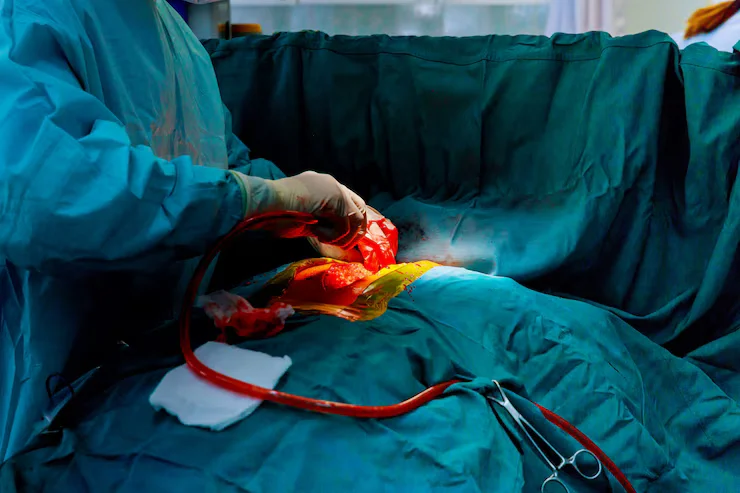-
BP Poddar Hospital
BP Poddar Hospital
Discover how Laparoscopic Cancer Surgery, performed by one of the best surgical oncologists, offers minimal pain, quicker recovery, and advanced cancer care treatment.

Laparoscopic cancer surgery has revolutionized how surgeons approach cancer treatment. This minimally invasive surgical method has become increasingly popular due to its numerous benefits, including quicker recovery, reduced pain, and fewer complications compared to traditional open surgery. If you or a loved one is facing cancer surgery, understanding what laparoscopic surgery entails can help you make informed decisions about your treatment plan.
In this comprehensive guide, we’ll walk you through everything you need to know about Laparoscopic Cancer Surgery, including how it works, its benefits, recovery process, and common questions people ask about this procedure.
Laparoscopic Cancer Surgery, also known as minimally invasive cancer surgery, is a technique where small incisions are made in the body, and a laparoscope (a thin tube with a camera and light) is inserted to view the organs and tissues inside. Surgeons use specialized instruments through these small incisions to remove cancerous tumors or perform other procedures related to cancer treatment.
Laparoscopic surgery is most commonly used in cancers involving the abdomen, pelvis, and chest, such as colorectal cancer, gynecological cancers, liver cancer, and certain types of lung cancer.
In a Laparoscopic Cancer Surgery procedure, the surgeon typically follows these steps:

Laparoscopic cancer surgery offers several advantages over traditional open surgery, including:
Laparoscopic surgery involves fewer and smaller incisions, resulting in less trauma to the body. This leads to reduced scarring and lower risk of infection.
Because of the smaller incisions, the body experiences less stress during the procedure, and recovery time is significantly shorter. Most patients can return to their daily activities much sooner than those who undergo open surgery.
Patients often experience less pain after laparoscopic surgery compared to open surgery. This is largely due to the minimal disruption to surrounding tissues.
Laparoscopic procedures generally have a lower risk of complications, such as blood loss, infections, and hernias, which are more common with open surgeries.
Since laparoscopic cancer surgery involves small incisions, the scars left behind are significantly smaller and less noticeable, contributing to better cosmetic outcomes.
Patients who undergo laparoscopic surgery often spend less time in the hospital. This leads to a quicker recovery and a faster return to normal life.
Recovery after Laparoscopic Cancer Surgery varies depending on the type of cancer being treated and the individual’s overall health. However, there are a few common things to expect:
Unlike open surgery, the hospital stay for laparoscopic surgery is usually shorter. Most patients can go home within 1-3 days post-surgery, depending on their condition and recovery progress.
Although laparoscopic surgery is less painful than traditional surgery, patients may still experience some discomfort. Doctors typically prescribe pain medications to manage this.
Most patients can resume light activities, such as walking, within a few days to a week after surgery. It’s important to follow the doctor’s guidelines and avoid strenuous activities until full recovery is achieved.
Regular follow-up visits to the surgeon are crucial for monitoring recovery and ensuring there are no complications. During these visits, the doctor will assess healing and may order additional tests to check for any signs of cancer recurrence.
The length of laparoscopic surgery depends on the type of cancer and the complexity of the procedure. Typically, it can take anywhere from 1 to 3 hours.
Yes, Laparoscopic Cancer Surgery is considered very safe when performed by an experienced surgical oncologist. It has been widely used with excellent results for many types of cancer.
Laparoscopic surgery can be highly effective in treating localized cancer by removing tumors or affected tissue. However, whether it provides a cure depends on the type, stage, and extent of cancer.
The recovery period varies by individual and type of cancer but typically lasts 2 to 6 weeks for most people. Full recovery can take a few months.
As with any surgery, there are risks, including bleeding, infection, or injury to surrounding organs. However, the risks of laparoscopic surgery are generally lower than open surgery due to the smaller incisions and minimally invasive nature.
When considering Laparoscopic Cancer Surgery, choosing the right surgical oncologist is crucial for achieving the best outcomes. Look for a surgeon who:

1. Can laparoscopic cancer surgery be used for all types of cancer?
Not all cancers are suitable for laparoscopic surgery, but it’s effective for many, particularly cancers of the abdomen and pelvis.
2. Is laparoscopic cancer surgery less expensive than open surgery?
Due to its minimally invasive nature and shorter recovery time, laparoscopic surgery can be less expensive in terms of hospital stays and post-surgery care.
3. How can I find the best surgical oncologist in Kolkata for laparoscopic surgery?
Look for experienced surgeons with positive patient reviews, a specialization in cancer surgery, and expertise in laparoscopic techniques.
Laparoscopic Cancer Surgery is a transformative approach to cancer treatment, offering numerous benefits such as quicker recovery, reduced pain, and fewer complications compared to traditional open surgery. This minimally invasive technique is now widely used for treating various cancers, including colorectal and gynecological cancers, making the process more efficient and patient-friendly.
To ensure optimal outcomes, seeking guidance from the best surgical oncologist in Kolkata is essential. Experienced oncologists bring expertise in laparoscopic techniques, enabling precise and effective cancer management. By understanding the process, its advantages, and recovery guidelines, patients can make informed decisions about their care and improve their chances of successful treatment.

January 30, 2025

January 29, 2025

January 28, 2025